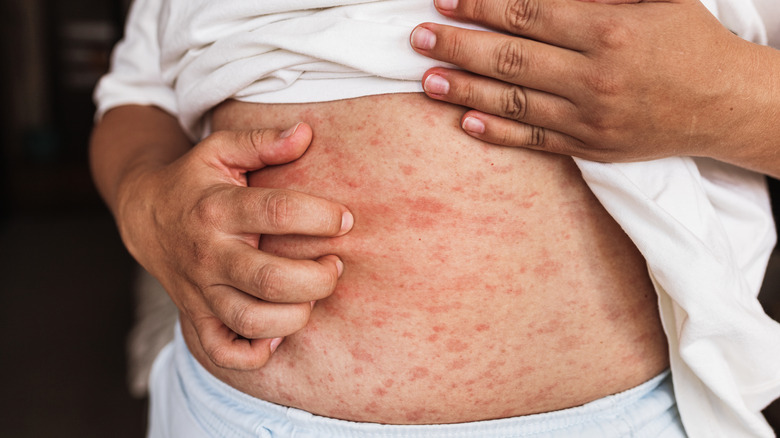How To Know If You're Allergic To Wine
Do you feel sort of off after enjoying a glass of chilled wine? We don't mean in the buzzed, semi-drunk way. Maybe you experience a severe rash, shortness of breath, or you end up with a pounding headache that completely destroys the mood. If you suffer from any of these symptoms, it might indicate that you've got a wine allergy.
Wine allergies — and allergies to other types of alcohol like tequila — are more common than you might think. A scientific paper published in Allergologie Select stated that 10% of the general population suffers from some type of intolerance or allergy-like reaction after consuming wine. That being said, it's important to distinguish between an allergy and intolerance. While an intolerance can cause uncomfortable symptoms — think of the gastrointestinal pain lactose intolerance people suffer from after eating some types of cheese — allergies have the potential to cause immediate and severe symptoms, including anaphylaxis.
Wine allergies are typically triggered by sulfites, histamines, or proteins found in the drink. It can be difficult to pinpoint which one of these is causing your reaction, but paying attention to the symptoms and doing a little research can help you diagnose, monitor, and manage a suspected wine allergy.
How sulfites, histamines, and proteins cause reactions
Sulfites are the first allergen we are going to focus on. Sulfites are frequently added to wine to preserve freshness and prevent spoilage. Despite their ubiquity, experts don't really know why some people have a negative reaction to sulfites, although there are a few theories out there. One of these is that some people's immune systems mistake sulfites for something dangerous. This results in antibodies "fighting" the sulfites, resulting in an allergic reaction. Another potential reason sulfites cause reactions is because they release sulfur dioxide, a gas that can irritate people's lungs and airways. Perhaps unsurprisingly, a paper published in Clinical & Experimental Allergy revealed that individuals with pre-existing respiratory conditions, such as asthma, are more likely to be sensitive to sulfites.
Histamines, a compound that's commonly found in wine, can cause symptoms similar to an allergic reaction. It is thought this happens to individuals whose body can't get rid of the chemical properly. An enzyme called diamine oxidase (DAO) helps break down histamine. Some believe low levels or reduced activity of DAO might cause these individuals to experience facial flushing, nasal congestion, and skin irritation when consuming food or drinks that are rich in histamine.
A few of the proteins in grapes or yeast can cause allergic reactions in some people. Several of these proteins, like thaumatin-like proteins and lipid transfer proteins, help protect plants, but in some people, the body mistakes them for harmful substances. Similarly to sulfites, the presence of these proteins can cause itching, swelling, or stomach problems as the body's immune system attempts to fight them off.
How to enjoy wine without the woes
The idea of giving up wine entirely might seem a little drastic, but it's the only guaranteed way to completely prevent these allergic reactions from occurring. However, if abstinence feels too extreme, there are some strategies you can use to mitigate the risk while still enjoying the odd glass.
If sulfites seem to be the issue, explore organic or sulfite-free wines. To be honest, no wine is entirely free of sulfites, but these options contain significantly lower levels than most other wines on the market. You might want to learn to love red wine — even though it's known to give some people terrible headaches — since it generally contains less added sulfites than white wine. For those sensitive to histamines, white wines are the better choice because they usually have a lower histamine content than red wines. You could also try taking an over-the-counter antihistamine before drinking wine in an attempt to reduce histamine-related reactions. Unfortunately, if you have an allergy to the proteins found in grapes, you should avoid wine — and other grape products — altogether.
If symptoms persist when you're drinking wine or you're unable to pinpoint the cause of your reaction, consult an allergist. They can perform tests to identify specific triggers and offer you some personalized advice.


